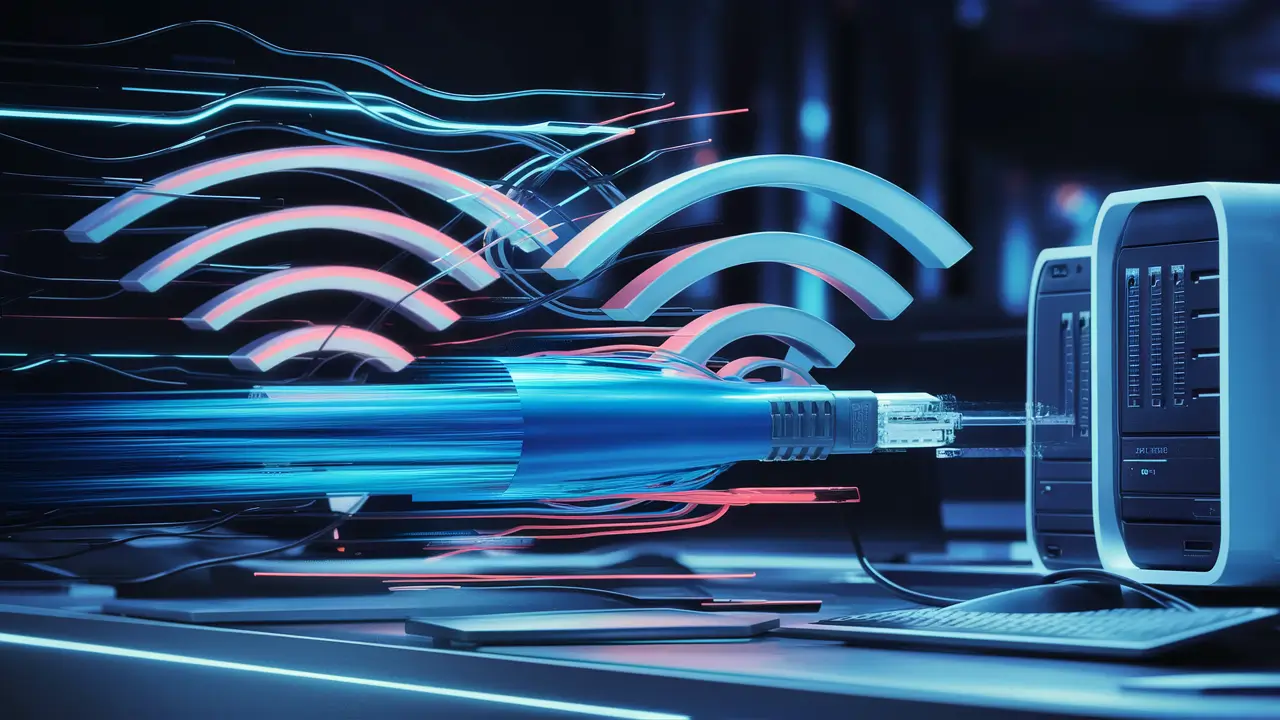-
Posted on: 12 Aug 2024

-
Is Ethernet Faster than Wi-Fi?
Whether you work from home, watch your favorite programs, or game online, having a fast and dependable internet connection is very vital in the digital era. Whether Ethernet is quicker than Wi-Fi is among the most often asked questions individuals have. We will therefore explore the technical features of both connection kinds, their advantages and drawbacks, and situations wherein one would be favored over the other.
Introduction
Two main ways one may access the internet are Ethernet and Wi-Fi. Both offer benefits, but their performance will differ based on numerous elements. This tutorial will clarify the variations between Ethernet and Wi-Fi and assist you in deciding which is speedier for your requirements.
Understanding Ethernet
What Is Ethernet?
An Ethernet is a wired connection wherein devices are connected to a network using wires. It is widely utilized in companies and households for consistent, fast internet connection. On one end, Ethernet cables hook into your router or modem; on the other, they enter your computer or another device.
Advantages of Ethernet
- Usually speaking, Ethernet connections provide more speed than Wi-Fi. Based on the cable type—e.g., Cat 5e, Cat 6, Cat 6a—they can enable speeds up to 10 Gbps.
- Wired connections provide a more constant and reliable connection as they are less likely to suffer signal loss and interference.
- Ethernet is suitable for online gaming and real-time applications as generally speaking, it has a shorter latency than Wi-Fi.
- Security: Since cable connections are not vulnerable to wireless hacking, they are by nature more secure.
Disadvantages of Ethernet
- Ethernet depends on a physical connection, so device mobility is limited. Either you should utilize lengthy wires or be close to an Ethernet port.
- Setting up an Ethernet network may be labor-intensive, particularly if you have to carry wires over big areas or through walls.
Understanding Wi-Fi
What Is Wi-Fi?
Wi-Fi is a wireless technology wherein devices may connect to a network without requiring actual wires. It runs a router or modem connecting devices using radio waves to send data. The convenience and adaptability of Wi-Fi make it extensively utilized in public areas, residences, and workplaces.
Advantages of Wi-Fi
- Wi-Fi is perfect for mobile devices such as laptops, tablets, and smartphones as it gives the ability to roam about free from cable attachment.
- Establishing a Wi-Fi network requires not running wires and is really easy.
- Multiple devices may join to a single Wi-Fi network without extra hardware, therefore saving convenience.
Disadvantages of Wi-Fi
- The distance from the router, the count of connected devices, and interference from other wireless devices will affect Wi-Fi performance. Although contemporary Wi-Fi standards—such as Wi-Fi 6—can provide high speeds—they are often slower than Ethernet.
- Stability: Wi-Fi connections are more vulnerable to signal loss and fluctuations resulting from electrical equipment (e.g., microwaves) and physical objects (e.g., walls).
- Security: Compared to connected connections, wireless networks are more prone to hackers and illegal access.
Ethernet vs. Wi-Fi: Speed Comparison
When comparing the speed of Ethernet and Wi-Fi, several factors come into play:
- Comparatively to most Wi-Fi networks, Ethernet cables—such as Cat 5e and Cat 6—can offer greater bandwidths (up to 10 Gbps).
- Physical objects, other wireless devices, and even weather may all influence Wi-Fi signals, therefore affecting speeds. These considerations have no bearing on Ethernet.
- Distance: The signal is weaker and the speed is slower the farther away from the Wi-Fi router. With conventional wires, Ethernet maintains constant speeds over distances—up to 100 meters.
Scenarios Where Ethernet Is Preferred
- Online gaming calls on Ethernet's low latency and consistent connections.
- High-speed and stable Ethernet allows high-end streaming services a great advantage.
- With Ethernet, big file transfers are quicker and more dependable.
- Work environments where many devices need a reliable connection find Ethernet to provide constant performance.
Scenarios Where Wi-Fi Is Preferred
- Mobility: Wi-Fi gives you the freedom and flexibility you need if you have to carry your gadgets.
- Wi-Fi is often enough for normal online surfing, social networking, and video chats.
- Public Spaces: Wi-Fi is perfect for cafés, airports, and other public places where many users require access free from the trouble of wires.
Conclusion
In essence, while both Ethernet and Wi-Fi have benefits and drawbacks, Ethernet's superior speeds, reliability, and security make it usually quicker and more dependable. Wi-Fi is appropriate for many daily uses, however, since it provides the simplicity of installation and mobility that many regular uses call for. In the end, your particular demands and use situation will determine which Ethernet and Wi-Fi you should choose. Knowing each other's capabilities and constraints can help you to maximize your internet connection for the best possible experience.
With DirecTV, change your perspective on watching. To discuss our ideas and choose the ideal package for you, give us a call at (855) 212-8877 right now. Our professionals are eager to help you and arrange excellent entertainment. Avoid waiting; get in touch right now!





